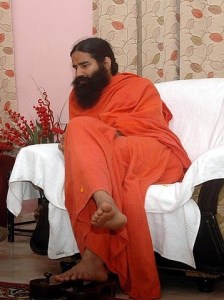|
|

Yoga guru Baba Ramdev has attracted criticism following controversial claims concerning the ongoing pandemic of the novel coronavirus, or COVID-19.
Ramdev, who uses the honorific title “Swami Ramdev” in addition to “Baba”, has reportedly angered public health professionals following his suggestion that Ashwagandha, an Ayurvedic remedy and common component of traditional medicine in India, could be effective in staving off the disease. In a video, Ramdev said “we’ve done scientific research and found Ashwagandha…doesn’t allow blending of corona protein with human protein.” Ramdev reportedly submitted the research to an international journal, but did not name the journal in question nor did he provide any evidence for the product.
Reuters quotes Dr Giridhar Babu, an epidemiology professor attached to the Public Health Foundation of India, who rebuked Baba Ramdev for his remarks. “These kinds of messages give a false sense of security,” Babu said. “People who are not well educated, they are the ones who will get misled.”
Baba Ramdev is the founder of the company Patanjali Ayurved, which claims a consumer reach exceeding five million and markets a range of Ayurvedic health products. Patanjali, which markets the product Baba Ramdev promoted, has reportedly witnessed a surge in demand for its products in the wake of the COVID-19 outbreak. Some of its products marketed as immunity boosters have witnessed a rise in demand of thirty to forty percent.
Baba Ramdev has urged calm but caution in the face of the coronavirus pandemic, stating “there is no need to fear from coronavirus but strictly take precautions to prevent its spread and infection.
“When you are at public places or are travelling by bus, train and flight then you must use sanitiser for your hands. You have to keep a distance of four to five feet from other persons in public places. You must also wear [a] mask.”
Baba Ramdev has also encouraged people to “practice yoga” and “follow a natural lifestyle to increase immunity and treat asthma, heart disease, and diabetes.” He noted “those having these lifestyle diseases are at more risk of getting infected with COVID-19.”
The merits of yoga, whilst good for cardiovascular health, physical fitness, and overall wellbeing, have been disputed in terms of coronavirus. FactChecker.in quoted global health, bioethics and health policy researcher Anant Bhan as saying “the claim that…yoga can help only adds to the misinformation and fear-mongering. This is not the time to be making such claims, rather we should be preparing to fight the disease scientifically. Making random claims around treatment or prevention is irresponsible.”
The controversy over Baba Ramdev’s remarks is not the first instance where the role of traditional medicine has been debated in the context of the coronavirus pandemic. The Telangana state government drew criticism after its AYUSH department dispensed what it claimed to a homoeopathic prophylactic medication with prospective preventative properties as it relates to COVID-19 – a move Health Issues India described at the time as “a highly reckless and dangerous idea and practice, given the lack of evidence for the arsenic-based treatment having any effect against COVID-19 or, indeed, against any disease at all.”
In Tamil Nadu, an alternative medicine practitioner claimed to have “formulated medicine from an extract of herbs” in the early stages of the outbreak. Purporting to have been successful in the treatment of other ailments such as dengue fever, the practitioner expressed “in coronavirus too, I am confident that our medicine will be very effective.” Others – including some activists and political figures – have promoted traditional medicine systems such as cow urine therapy.
The Union Government has, in recent years, actively promoted alternative and traditional systems of medicine and established the Ministry of Ayurveda, Yoga and Naturopathy, Unani, Siddha, and Homoeopathy (AYUSH). However, there is dispute over the efficacy of a number of treatments that fall under the AYUSH umbrella – with the scientific community’s concerns at times provoking vociferous debate within India.
The AYUSH Ministry has been seen to promote alternative and traditional treatments for coronavirus. However, Manipal Institute of Virology director G. Arunkumar told FactCheck.in that “there is no scientific evidence to support claims regarding use of natural remedies for COVID-19. This is the time to ensure correct information is shared. For example, there is evidence that hand washing reduces transmission.”
Misinformation concerning the coronavirus pandemic is rife. The propagation of claims that treatments ranging from cow urine therapy to sesame oil has been condemned by the World Health Organization (WHO). The problem is not limited to India; fake news is a global problem when it comes to public health. The need of the hour is for public figures, affiliated to government agencies or not, to be responsible when they make claims and for the public health community and relevant statutory bodies to hold them to account when they fail to do so.



